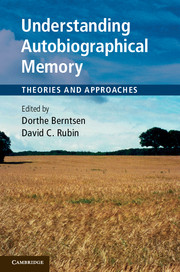Book contents
- Frontmatter
- Contents
- List of figures
- List of tables
- List of contributors
- Preface
- Acknowledgements
- 1 Introduction
- Part I Approaches to the study of autobiographical memory
- 2 The basic systems model of autobiographical memory
- 3 Identity, emotion, and the social matrix of autobiographical memory: a psychoanalytic narrative view
- 4 On the nature of autobiographical memory
- 5 Reflections on autobiographical memory
- Part II Neural studies of autobiographical memory
- Part III Social and cultural aspects of autobiographical memory
- Part IV Development of autobiographical memory from infancy to old age
- Part V Evolution and basic processes of autobiographical memory
- Part VI Discussion
- Index
- References
2 - The basic systems model of autobiographical memory
Published online by Cambridge University Press: 05 November 2012
- Frontmatter
- Contents
- List of figures
- List of tables
- List of contributors
- Preface
- Acknowledgements
- 1 Introduction
- Part I Approaches to the study of autobiographical memory
- 2 The basic systems model of autobiographical memory
- 3 Identity, emotion, and the social matrix of autobiographical memory: a psychoanalytic narrative view
- 4 On the nature of autobiographical memory
- 5 Reflections on autobiographical memory
- Part II Neural studies of autobiographical memory
- Part III Social and cultural aspects of autobiographical memory
- Part IV Development of autobiographical memory from infancy to old age
- Part V Evolution and basic processes of autobiographical memory
- Part VI Discussion
- Index
- References
Summary
I outline the basic systems model, a theory that can account for the encoding and retrieval of autobiographical memories (Rubin, 1998, 2005, 2006). Next I demonstrate that the model adapts easily for other related tasks in order to address what aspects of autobiographical memory the basic systems model is trying to explain, and how varying the activity of the basic systems can produce different classes of memories. Finally, in order to contrast the model most starkly to current cognitive theory and major alternative accounts of autobiographical memory based on it, I consider four central assumptions that lead to three fundamental claims, which are all counter to the basic systems model but which are central to other accounts of cognition and autobiographical memory. The clearer and stronger my discussion of these claims, the easier it will be to see if I am misguided. I may be wrong, but I will try not to be boring.
The model applied to an autobiographical event
The prototypical autobiographical event whose memory I wish to explain is a single ride on a merry-go-round at an amusement park. This chapter is about a model that could describe an autobiographical memory of this event if it were based on our most basic, solid, current understanding of the mind and the brain, instead of trying to modify models initially based on a 1960s computer. The model needs to account for or include the phenomenological, metacognitive judgments of reliving the ride and believing that it really happened to you, the various emotions from boredom to joy that might accompany this particular event, a general knowledge of the physical ride that would allow you to choose a seat with or without vertical motion, the script for paying for and taking such a ride, and a narrative context in which this event is embedded and which helps you understand and share with others the significance of the ride. Components should include rich visual imagery for the brightly colored animals, auditory imagery for the imitation calliope, spatial imagery for the ride and its surrounds, olfactory imagery for odors from nearby food stands, kinesthetic imagery of motion, and even an account of why the visual and spatial images are stronger than the olfactory and kinesthetic ones.
- Type
- Chapter
- Information
- Understanding Autobiographical MemoryTheories and Approaches, pp. 11 - 32Publisher: Cambridge University PressPrint publication year: 2012
References
- 10
- Cited by



